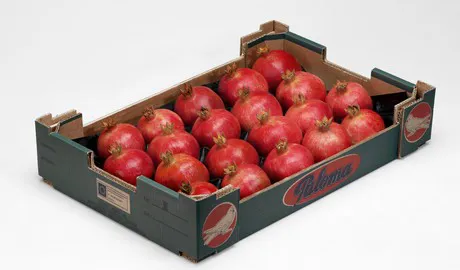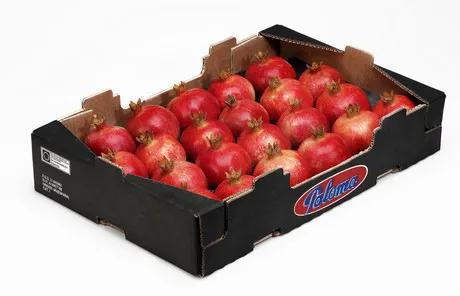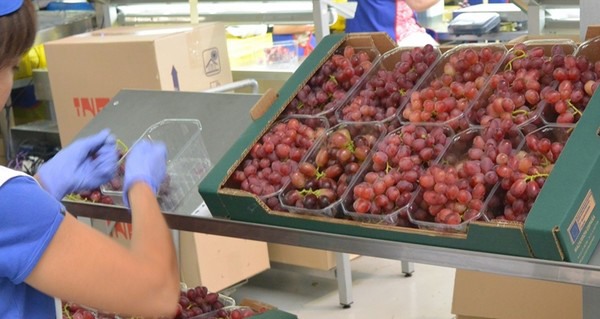The earliest pomegranate harvests kicked off in mid-August with limited volumes and good market conditions, due to the also relatively low supply available from other origins. In a few days, the campaign will start in Murcia for companies such as Grupo Paloma.
"We expect the best pomegranate harvest of the last 4 to 5 years," says David Franco, from the commercial department of Grupo Paloma. "Thanks to the lack of weather incidents so far and the fact that we have done a good job in the field, we are obtaining high quality fruit, with a very clean skin and great health. Wet springs and September rains can be very detrimental to the quality of the product, but this year there have been no setbacks."

The Murcian company has made significant investments in varietal reconversion and has increased its production in recent years, focusing on red varieties such as the Wonderful, as well as other sweet varieties. "Last year we had the first significant harvest in terms of volume of the Birgful variety, a sweet fruit with beautiful red arils, as well as a very bright and striking reddish skin. We believe this variety has all the attributes that the market demands. We expect the production of this variety to continue to grow in the coming years, as the trees we have planted are still young," he says.
According to David Franco, "although many European supermarket chains usually have pomegranates available on their shelves all year round, consumers continue to associate pomegranates with the fall, as we see consumption increasing at this time of the year. In markets such as Spain, where the Mollar variety has traditionally been the one consumed, just like in Italy or France, varieties such as the Bigful and others with similar characteristics are called to boost the consumption of this fruit, which remains small."

According to David Franco, pomegranate consumption is not just a fad, but a rising trend within the exotic and red fruit category, as long as things are done right. "Many companies are growing with the sale of fresh, ready to eat pomegranate products, such as arils in tubs, whose demand is recording double-digit growth annually in countries such as Germany. The standards at which pomegranates are produced have improved quite a bit. There is a search for fruit with a very good appearance and flavor, better sizes and a good post-harvest. Pomegranates cannot be treated as a product for local consumption, or intended for very specific traditional markets. If we want to grow, we have to do a good job when it comes to quality standards, from sourcing to production and handling, to be able to compete with other good products of the same category on the shelves."
Grupo Paloma's pomegranates will be available from September 13 up until the end of the year. "The harvest ends at the end of October, but thanks to our planned storage in specialized refrigerated chambers, we can extend the marketing up until week 52 with a product that guarantees quality and freshness," he says.
"Table grape consumption is expected to pick up from mid-September"
The Murcian company has been harvesting and marketing table grapes since June 20 and still has 7 weeks to go before the end of the campaign. "If no setbacks occur, this year we are going to have a good quality harvest and our customers are delighted. Normally, the demand drops around the last week of August and the first two weeks of September, but we expect it to pick up again from September 15, when children will go back to school," says David Franco.

David Franco highlighted the great growth in the consumption of seedless grapes in countries where seeded grapes have traditionally been consumed, especially in Spain. "The growth in consumption has resulted in a greater presence of the product on the shelves of retail chains, where more varieties and even specialties are becoming available. Table grapes are increasingly deseasonalized in Spain."
"This year we expect less overlap between Spanish and Dutch tomatoes."
Despite the importance of table grapes, pomegranate or stone fruit in the summer and autumn period, tomatoes are Grupo Paloma's core business, and they are currently starting with the first exports. "The tomatoes we are marketing now meet the demands of some Spanish chains with which we work all year round, as well as of some European customers who are already asking us for some products, like loose round tomatoes or specialties, with which we used to start in October. In August and early September there has been a lot of uncertainty in the production and prices due to the impact of adverse weather conditions in Europe. This has had a negative influence on the quality and regularity in the supply from countries such as the Netherlands. While there is usually some overlap in October between the central European productions and the Spanish ones, the transition this fall is expected to be much cleaner."
The company will start the tomato campaign with new varieties that have been in trials for 2 years, as well as investments in the production area and in the packing plant. Grupo Paloma will be exhibiting at the next Fruit Attraction, in Hall 7, stand 7D02.
 For more information:
For more information:
David Franco
Grupo Paloma
T: +34 968590001
davidF@gpaloma.com
www.gpaloma.com
